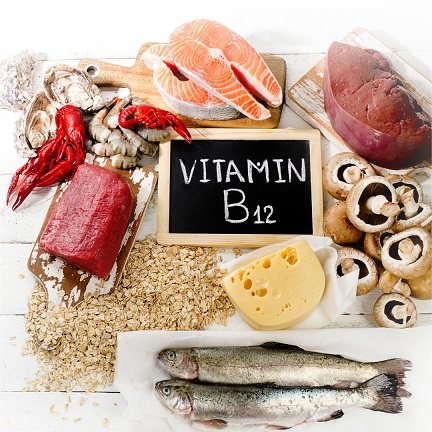.png)
What is Vitamin B12 & why do we need it?
Vitamin B12 or cobalamin, is one of eight B vitamins that work in unison to keep our bodies working optimally. Vitamin B12 has many important jobs to do, from supporting nerve health to renewing body cells and fighting fatigue, B12 does it all! In order to carry out all these tasks, our bodies need a regular supply of this wonder vitamin to keep them in tip-top condition.
Unfortunately however, B12 cannot be produced by our bodies which means we need to eat it as part of our diet, or take it as a supplement. As a rough guide, the recommended intake for adults is 2.4ug daily - this can be quite a difficult amount to achieve, particularly for vegans or those with a restricted diet. Another difficulty is that this key vitamin is mainly found in animal-derived products, particularly meat, dairy and eggs. This can make it difficult for vegetarians and vegans need to ensure they get the required amount of B12 daily to avoid a deficiency.

B12 Deficiency
Vitamin B12 deficiency is not uncommon, particularly in vegans or those with a restricted diet. This important nutrient is found naturally in certain animal products, like meat and chicken, as well as eggs and cheese. In recent years, some non-animal derived foods have been fortified with B12 in an attempt to reduce B12 deficiency but it can be particularly difficult for vegans to eat enough of these foods to avoid a B12 deficiency. This can lead to symptoms of B12 deficiency such as:
• A sore, red tongue
• Pale, slightly yellow colouring of your skin
• Mouth ulcers
• Feeling tired and listless
• Feeling of irritability
• Depression or low mood
• Disturbed vision
• Paraesthesia (Pins and needles)
What does B12 do?
Red Blood Cells
Adequate intake of Vitamin B12 is needed for the formation of red blood cells. Red blood cells are produced at a staggering rate! It is estimated that the human body makes around 1.6 billion red blood cells every minute. That's 100 billion every hour. As you may have guessed, red blood cells are important! They provide oxygen to body tissues ensuring body tissues have adequate oxygen supply to function. If vitamin B12 levels are too low, the production of red blood cells is compromised which can lead to long-term problems and health-issues such as megaloblastic anaemia.
Mood Management
Vitamin B12 deficiency has further been linked to low mood and symptoms of depression. B12 is needed by our bodies to produce serotonin - one of the important neurotransmitters that helps to regulate mood. Although research indicates that those who have an existing B12 deficiency may benefit from B12 supplementation, research does not suggest that B12 supplementation eases depressive symptoms in those with normal B12 levels.
Brain & Memory
Maintaining adequate levels of vitamins B6, B12 and folic acid helps to control homocysteine levels in your blood. Homocysteine can be used as a a predictor of potential health problems such as cardiovascular disease and age related cognitive decline. You can take all three of these B vitamins together as part of a B Complex (make sure there are adequate levels of B12, especially if you suspect you are deficient); or a specific homocysteine regulating supplement - Solgar do an excellent formula called Homocysteine Modulators which is an excellent supplement designed to promote a healthy balance of homocysteine levels.
Energy
If you're B12 deficient, taking a B12 supplement can certainly give you an energy boost; in fact one of the first symptoms noted of a vitamin B12 deficiency is often fatigue and listlessness. Taking a good quality, easy-to-absorb B12 supplement can make a huge difference in terms of energy levels and it can feel like quite a remarkable difference to those who are B12 deficient.
If you think you might be low in B12, you can ask your G.P or healthcare professional to test you for vitamin b12 deficiency. It is advisable to check with your G.P before taking supplements - particularly if you are already taking medication or have a pre-existing condition.
